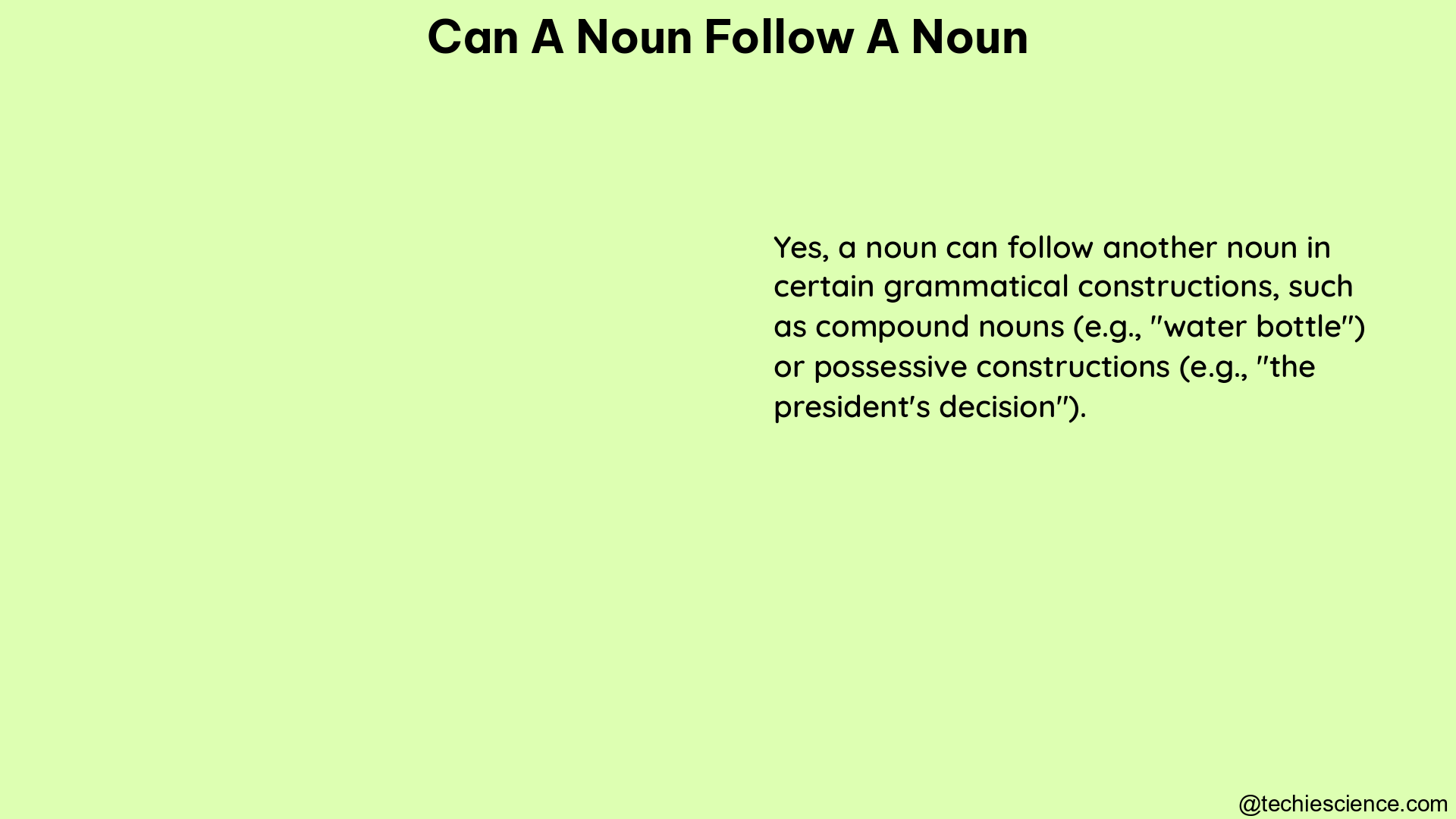Yes, a noun can follow another noun in various grammatical constructions. Here are some advanced details and examples:
Compound Nouns
Compound nouns are formed by combining two or more nouns. These can be written as one word (e.g., “bookshelf”), separated by a space (e.g., “post office”), or joined by a hyphen (e.g., “self-portrait”). Compound nouns are a common way to create new words in the English language.
Some examples of compound nouns include:
- Bedroom
- Sunflower
- Toothbrush
- Laptop computer
- Ice cream
- Washing machine
Compound nouns can be formed using various combinations of nouns, such as:
- Noun + Noun (e.g., “bookshelf”)
- Adjective + Noun (e.g., “blackboard”)
- Verb + Noun (e.g., “typewriter”)
- Noun + Verb (e.g., “dishwasher”)
The formation of compound nouns follows specific rules and patterns, and they can serve different grammatical functions within a sentence.
Attributive Nouns

Attributive nouns, also known as noun adjuncts, are nouns that modify another noun. They provide additional information about the noun they precede. For example, in the phrase “chicken soup,” the noun “chicken” modifies the noun “soup” and provides information about the type of soup.
Some other examples of attributive nouns include:
- “Apple pie” (where “apple” modifies “pie”)
- “Leather jacket” (where “leather” modifies “jacket”)
- “Silk scarf” (where “silk” modifies “scarf”)
- “Cotton shirt” (where “cotton” modifies “shirt”)
Attributive nouns are commonly used to describe the material, origin, function, or other characteristics of the noun they modify. They can help to provide more specific and detailed information about the noun.
Plural Nouns
Plural nouns can be followed by another plural noun. For instance, in the sentence “I gave each of my cousins presents,” the plural noun “cousins” is followed by the plural noun “presents.”
This construction is often used to indicate a group or collection of items. Some additional examples include:
- “The children’s toys”
- “The women’s hats”
- “The students’ textbooks”
- “The dogs’ leashes”
In these cases, the first plural noun (e.g., “children’s,” “women’s,” “students’,” “dogs'”) modifies the second plural noun (e.g., “toys,” “hats,” “textbooks,” “leashes”).
Noun Modifiers
Noun modifiers are used to describe another noun. They can indicate parts of a noun, the material it is made of, its function, or its age or length. For example, in the phrase “tennis shoes,” the noun “tennis” modifies the noun “shoes” and provides information about the type of shoes.
Some other examples of noun modifiers include:
- “Wooden table” (where “wooden” modifies “table”)
- “Vintage car” (where “vintage” modifies “car”)
- “Desk lamp” (where “desk” modifies “lamp”)
- “Cooking oil” (where “cooking” modifies “oil”)
Noun modifiers can help to provide more specific and detailed information about the noun they are describing, allowing for more precise and nuanced communication.
Examples
- “Notifications settings” is a compound noun where “notifications” modifies “settings.”
- “Creativity quality” is not grammatically correct, but “creative quality” would be a correct attributive noun construction.
- “The students’ textbooks” is an example of a plural noun (students’) followed by another plural noun (textbooks).
- “Wooden table” is an example of a noun modifier (wooden) describing the noun (table).
Key Points
- Compound nouns are formed by combining two or more nouns, and they can be written as one word, separated by a space, or joined by a hyphen.
- Attributive nouns modify another noun, providing additional information about the noun they precede.
- Plural nouns can be followed by another plural noun, often to indicate a group or collection of items.
- Noun modifiers provide additional information about the noun they are describing, such as its parts, material, function, or age/length.
References
- https://dictionary.cambridge.org/us/grammar/british-grammar/nouns-compound-nouns
- https://www.reddit.com/r/grammar/comments/vaoh1p/never_have_thisthat_without_a_noun_immediately/
- https://english.stackexchange.com/questions/497087/can-plural-noun-be-followed-by-another-plural-noun
- https://ell.stackexchange.com/questions/210865/can-a-noun-be-used-to-describe-another-noun
- https://langeek.co/en/grammar/course/486/noun-modifiers

Hi…..I’m a graduate with a Bachelor’s degree in English Literature. I wish to do a Masters in the same field someday and continue my career in Academia.
Let’s connect through LinkedIn: